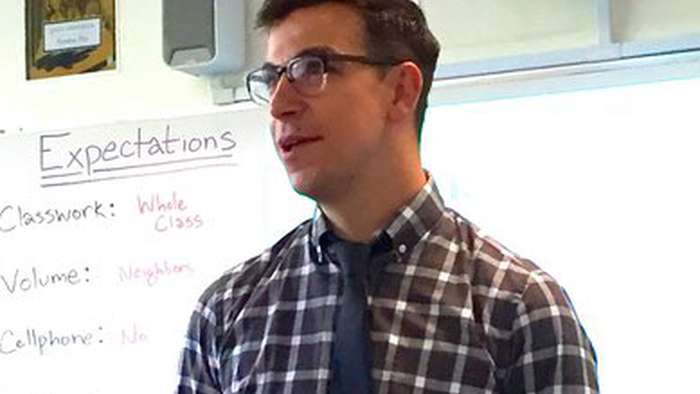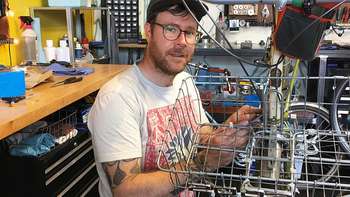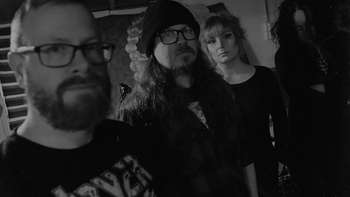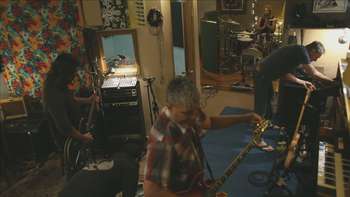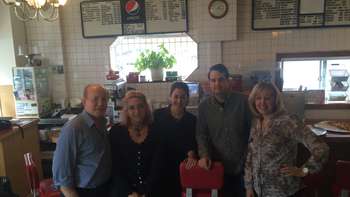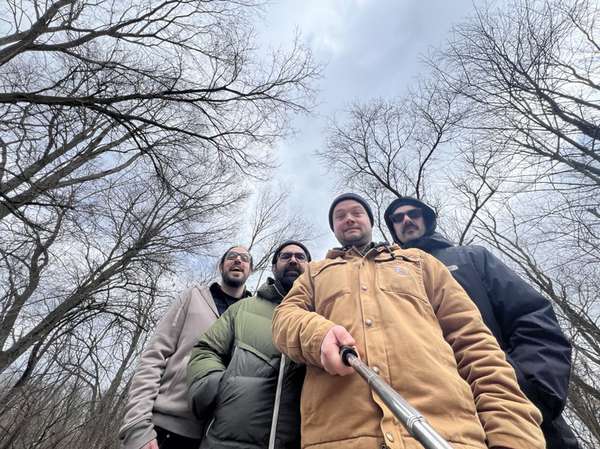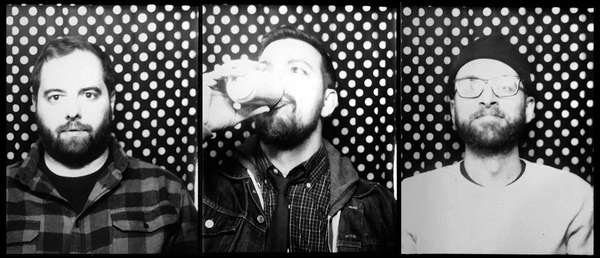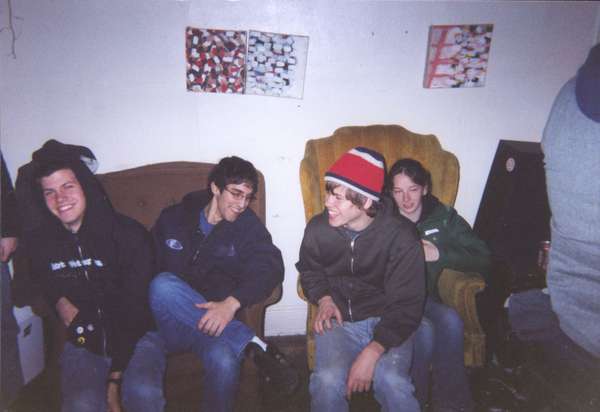There are a lot of misconceptions about the life of a musician. The old rock star image of bright lights, fast living and traveling with an entourage is almost patently false. Sure, it’s reflective of a few artists from yesteryear who had platinum records and died young, but most musicians have day jobs –- and not just to pay the bills. Jobs provide new challenges, personal fulfillment and, yes, some rent or gas money.
And usually when somebody is writing a new record or scheduling a tour, they have to balance that with their job.
How an artist spends their time by day will influence the creative process at night. In Don’t Quit Your Day Job, Scene Point Blank looks at how musicians split their time, and how their careers influence their music –- or, alternately –- how their music provides escape.
In this installment we emailed with Marco Reosti, owner of Salinas Records and bassist/vocalist in Quaker Wedding, who released In Transit this year. In this piece, we asked Marco about working as a public school teacher.
Scene Point Blank: You’re a teacher, right? What do you teach and how long have you been doing it?
Marco Reosti: This is my 15th year working as a teacher in public schools, mostly teaching high school History and English classes.
Scene Point Blank: What is your education? What brought you to this specific job?
Marco Reosti: I took the long route through undergrad, dropping out, working full-time while going to school part-time and traveling/touring but by the time I was 25 I knew I wanted to go into teaching. From that point on it was pretty traditional; I got an undergraduate degree in History with a certification in teaching and went straight to student teaching.
Scene Point Blank: Obviously 2020 is a new environment for teaching. How are you managing the current situation (online or hybrid classes)?
Marco Reosti: I’m working completely online and trying my best to balance my own sanity with making sure that what I’m giving my students is a meaningful experience, knowing that virtual classes won’t replace the full school experience. It’s difficult to not have any clear division between my work environment and my home, but I do have the good fortune to be working with high school seniors this year. Because they’re at the end of the K-12 education, I don’t feel the same urgency as someone who might be teaching students just learning to read and watching as some struggle to keep up. I’m trying to do things that will help them beyond the walls of high school, whether that’s writing their College Admissions Essay or studying and engaging them in political activism.
"I’m trying to do things that will help [my students] beyond the walls of high school, whether that’s writing their College Admissions Essay or studying and engaging them in political activism."
Scene Point Blank: What got you interested in this kind of work?
Marco Reosti: I grew up in Detroit in the 1980s, a white kid in an overwhelmingly Black public school. When my family moved to the suburbs, I had some awareness of the difference in the school I was attending. I certainly couldn’t name it or articulate what was happening, but even at a young age I had some sense that something was very very wrong with the system that created that disparity. Around the age of 20, I read Savage Inequalities by Jonathan Kozol (thanks in part to The Broadways) and it hammered home the structural racism that permeated the public school system, specifically by using property tax revenues to fund schools. One of the things I recognized was that underfunded public schools experienced higher teacher turnover, which negatively impacts students. I had the desire to teach in a place that experienced high turnover and stay there.
Scene Point Blank: Have you been in bands as your career has progressed? (i.e. Were you a teacher or a musician first and has one affected the other’s growth?)
Marco Reosti: I started playing in bands and doing the record label just a few years before I started teaching, so balancing those aspects of my life has been pretty much a constant in my adult life. Becoming a full-time teacher certainly meant that any band I was in was unlikely to tour regularly, which was fine with me by that point.
Scene Point Blank: What’s the biggest challenge in balancing your career with your music?
Marco Reosti: Balancing the label and playing in bands with teaching is so normalized in my adult life and all three of those pieces are so important to me that I don’t really think it’s much of a challenge to balance them.
Scene Point Blank: How does your job influence your music schedule –- both in “normal” times and during COVID? (Examples: writing or touring)
Marco Reosti: Regular touring is off the table, but that’s okay with me. My job is one with a clearly set schedule and one of the things I enjoy is setting time aside to not think about teaching after the school day ends and committing that time to practice or doing work for the label.
Scene Point Blank: Do you ever find yourself writing songs about recently covered classroom topics?
Marco Reosti: Not exactly, but teaching has definitely influenced some songs I’ve written. I have written a few songs about the frustration of working in public education or just in general the frustration that comes from working in a field where you run up against entrenched structures that you want to change.
Scene Point Blank: If you could change one thing (a realistic, not top-down, change) about the current structure, what would it be?
Marco Reosti: I think a realistic, although certainly top-down, change I’d like to see is that I wish more parts of the U.S. would adopt regional school districts. Since housing remains one of most segregated aspects of life in our country (the military and workforce are far more integrated), the parts of the U.S. that have schools for each individual community often experience more school segregation than those that use regional our county-wide schools. Far from perfect, parts of the U.S. with regional, as opposed to municipal, school systems are often more integrated. Those systems also help share costs and resources, which is important in creating equal funding for all students.
Scene Point Blank: Have your experiences from making music or touring influenced your career in any surprising ways? I imagine a few skill sets help in both, like speaking in front of groups?
Marco Reosti: Surprisingly, speaking in front of a class has not made stage banter much easier. Those are very different audiences. But being involved in punk and touring have definitely influenced my teaching. First of all, I got to see most of the country and, as a social studies teacher, I find that really valuable. But maybe more importantly, traveling with bands allowed me to think differently about college and all the ways that you can make your own path even if I took a mostly traditional one.
Scene Point Blank: Are your coworkers aware of your music? (I’ll ask about students later.)
Marco Reosti: I think most of my coworkers know at this point, but I usually only actively invite the people I’m close with into that world.
Scene Point Blank: Were they aware at the start, like at the job interview or hiring stage?
Marco Reosti: When I first started teaching, I kept those parts of my life very separate. I was still struggling to become the kind of teacher I wanted to be and I didn’t want to give anyone I worked with any reason to think I wasn’t committed to becoming a better teacher. Eventually, as I became more confident in my abilities in the classroom, I let more and more people into part of my life.
Scene Point Blank: Do you think some employers might view being a musician as a distraction from your career?
Marco Reosti: I’m sure there are, but to be honest they aren’t the kinds of jobs I’d want. Fifteen years ago, when I got started, I was worried about that and did stuff like making sure my tattoos were never visible at work. But part of that is the imposter-syndrome that you experience when you start any career; you don’t want to give anyone any more reason to question whether you belong. Today, I’m well aware that having interests outside of school makes me a more well-rounded person and a better educator and any place that doesn’t see it that way isn’t an environment I’d want to work in.
"Today, I’m well aware that having interests outside of [work] makes me a more well-rounded person and any place that doesn’t see it that way isn’t an environment I’d want to work in."
Scene Point Blank: How about your students? Do you tell them you’re a musician or do they ever google you and find out?
Marco Reosti: If it comes up, it comes up. Since I’ve moved to New York City, I occasionally have to bring my guitar to work since I’m reliant on public transportation. I have a policy of never lying to students, so I tell them I’m in a band, but I draw the line at giving them the details. I find that when you’re a teacher your students are really interested in your life when you’re in front of them, but you're out of their field of vision, you don’t cross their mind. I highly doubt they’ve googled me. The label comes up a lot less frequently.
Scene Point Blank: If applicable, what is their typical reaction?
Marco Reosti: By this point I’m 40 years-old, so they are a little surprised that I’m in a band but don’t have any real interest in the music I’m making or releasing.
Scene Point Blank: Depending what kind of school you’re at, you’re something of a public figure. Has that ever affected what you might put in a song –- making sure it isn’t taken the wrong way?
Marco Reosti: Currently I work in the largest school system in the country, so I feel pretty anonymous.
Scene Point Blank: What advice would you give to others who might be interested in teaching but don't know where to start?
Marco Reosti: Read Jonathan Kozol’s book Letters To A Young Teacher. Find a school in your community that will let you observe. Read a lot about education policy. Talk to teachers who are at different points in their careers.
Scene Point Blank: Anything you’d like to add?
Marco Reosti: One of the things I’m really proud of is that Salinas has released records for artists like Freezing Cold, Partial Traces, Jason Anderson, Marge, Matha and quite a few others that include educators or those whose time in education was influenced by their time in punk.
